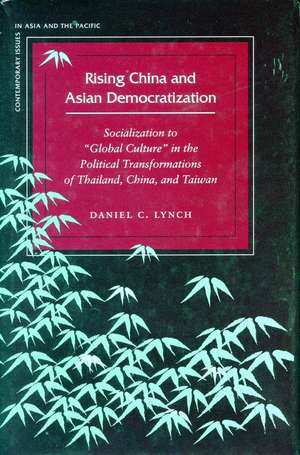Rising China and Asian Democratization: Socialization to "Global Culture" in the Political Transformations of Thailand, China, and Taiwan: Contemporary Issues in Asia and Pacific
Autor Daniel Lynchen Limba Engleză Paperback – 20 aug 2008
This book argues that democratization is inherently international: states democratize through a process of socialization to a liberal-rational global culture. This can clearly be seen in Taiwan and Thailand, where the elites and attentive public now accept democracy as universally valid. But in China, the ruling communist party resists democratization, in part because its leaders believe it would lead to China's "permanent decentering" in world history. As China's power increases, the party could begin restructuring global culture by inspiring actors in other Asian countries to uphold or restore authoritarian rule.
| Toate formatele și edițiile | Preț | Express |
|---|---|---|
| Paperback (1) | 227.94 lei 3-5 săpt. | |
| Stanford University Press – 20 aug 2008 | 227.94 lei 3-5 săpt. | |
| Hardback (1) | 777.93 lei 6-8 săpt. | |
| Stanford University Press – 6 iul 2006 | 777.93 lei 6-8 săpt. |
Din seria Contemporary Issues in Asia and Pacific
-
 Preț: 363.57 lei
Preț: 363.57 lei -
 Preț: 182.77 lei
Preț: 182.77 lei -
 Preț: 271.29 lei
Preț: 271.29 lei -
 Preț: 265.77 lei
Preț: 265.77 lei -
 Preț: 224.84 lei
Preț: 224.84 lei -
 Preț: 226.40 lei
Preț: 226.40 lei -
 Preț: 207.39 lei
Preț: 207.39 lei -
 Preț: 237.41 lei
Preț: 237.41 lei -
 Preț: 213.10 lei
Preț: 213.10 lei -
 Preț: 253.97 lei
Preț: 253.97 lei -
 Preț: 157.94 lei
Preț: 157.94 lei -
 Preț: 159.99 lei
Preț: 159.99 lei -
 Preț: 170.40 lei
Preț: 170.40 lei -
 Preț: 154.85 lei
Preț: 154.85 lei -
 Preț: 214.22 lei
Preț: 214.22 lei -
 Preț: 210.91 lei
Preț: 210.91 lei -
 Preț: 296.21 lei
Preț: 296.21 lei -
 Preț: 264.61 lei
Preț: 264.61 lei
Preț: 227.94 lei
Nou
Puncte Express: 342
Preț estimativ în valută:
43.62€ • 46.64$ • 36.37£
43.62€ • 46.64$ • 36.37£
Carte disponibilă
Livrare economică 27 martie-10 aprilie
Preluare comenzi: 021 569.72.76
Specificații
ISBN-13: 9780804761048
ISBN-10: 0804761043
Pagini: 320
Dimensiuni: 152 x 229 x 18 mm
Greutate: 0.44 kg
Editura: Stanford University Press
Colecția Stanford University Press
Seria Contemporary Issues in Asia and Pacific
ISBN-10: 0804761043
Pagini: 320
Dimensiuni: 152 x 229 x 18 mm
Greutate: 0.44 kg
Editura: Stanford University Press
Colecția Stanford University Press
Seria Contemporary Issues in Asia and Pacific
Recenzii
"The book is based on a very rich trove of recent, original research that will interest area specialists. At the same time, it makes a very interesting and innovative argument that scholars of globalization, democratization, and political development will want to read . . . the theoretical argument is original, thought-provoking, well-argued, and interesting, and offers a very pointed challenge to conventional wisdom. The way Lynch talks about China is brilliant."—Shelley Rigger, Davidson College
"(The book) is magisterial. Because it encompasses so much and challenges so much, its theses will be debated. The book will prod people to do review essays and hold symposia. In short, it is a very important work. This is superb scholarship."—Edward Friedman, University of Wisconsin-Madison
"...significant and clearly articulated..."—Library Journal
"Lynch's theoretical framework provides a new perspective on the variable of global culture; his arguments are likely to inspire much debate and reflection in policy making and scholarly circles."—Taiwan Journal of Democracy
"In Rising China, Lynch has fashioned a masterful intellectual work. The book is substantively and intellectually rich--at times exuberantly so...Rising China should establish Lynch as one of the major scholars in contemporary US-China relations." – International Studies Review
Notă biografică
Daniel C. Lynch is Associate Professor of International Relations at the University of Southern California. He is also the author of After the Propaganda State: Media, Politics, and "Thought Work" in Reformed China (Stanford, 1999).
Descriere
This book argues that states democratize through a process of socialization to a liberal global culture. This can be seen in Taiwan and Thailand, whereas in China the Communist party resists democratization.
Textul de pe ultima copertă
“The book is based on a very rich trove of recent, original research that will interest area specialists. At the same time, it makes a very interesting and innovative argument that scholars of globalization, democratization, and political development will want to read . . . the theoretical argument is original, thought-provoking, well-argued, and interesting, and offers a very pointed challenge to conventional wisdom. The way Lynch talks about China is brilliant.”—Shelley Rigger, Davidson College
“(The book) is magisterial. Because it encompasses so much and challenges so much, its theses will be debated. The book will prod people to do review essays and hold symposia. In short, it is a very important work. This is superb scholarship.”—Edward Friedman, University of Wisconsin-Madison
“(The book) is magisterial. Because it encompasses so much and challenges so much, its theses will be debated. The book will prod people to do review essays and hold symposia. In short, it is a very important work. This is superb scholarship.”—Edward Friedman, University of Wisconsin-Madison









